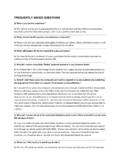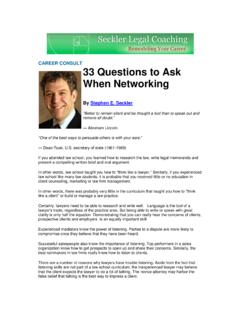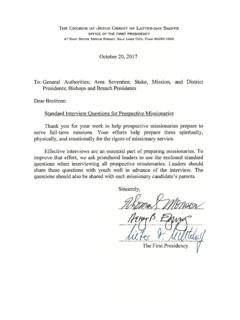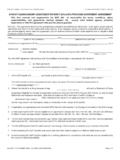Transcription of say? Where do I start? He - WJF Institute
1 Twenty Questions You should Ask current and prospective Clients By William J. Flannery, Jr., JD You ve done your research about the client or prospect, thought about communication strategies, and completed your pre-interview plan, but you may still be wondering: What do I say? Where do I start? Here s Where rainmaking often turns into drought. Lawyers inexperienced in business development often make the crucial mistake of assuming that they re the ones who are supposed to do all the talking. For lack of anything better to do, they start their sales pitch. Or they try to convince clients or prospective clients that the firm has a number of good lawyers who can help them. Or more likely, they start with small talk as their way of trying to build rapport. For the first 45 minutes they focus on sports, the weather, or subject matter that borders on the trivial, and is, often, inappropriately personal.
2 But clients and prospective clients don t want a poorly thought out sales pitch, and they don t need to be told about your lawyering skills. They probably assume you re good at what you do, or you wouldn t have gotten this far. And they certainly don t want personal, small talk. They re as busy as you are. What they want is to feel comfortable with you as a professional and to see Where you and your firm might fit in with their business objectives. To make them comfortable, you must get them to talk about themselves and their business objectives. Your efforts should focus on listening to their responses. The more they talk, the more you ll learn. And the more you learn, the more natural the process becomes. In business development, information is always power because it means knowing what they need. Knowing what to ask and how to ask is an art and a science. The twenty essential questions proposed here are broad enough to apply to most types of clients both current and prospective yet specific enough to elicit the concrete information essential for effective business development.
3 While many of these questions appear to target new clients, it is surprising how much lawyers don t know about the clients they ve been serving for years. When those lawyers take the time to learn they often find that there is substantial business going elsewhere which, with a little effort, could be kept in the family. First, here are a few basic rules: Show respect for your client s time. Demonstrate your ability to perform due diligence before a meeting, by asking questions that show you have mastered basic background information on the person you re meeting with, his or her company and industry, and the company s overall legal matters. Much of this is easily obtained from publicly available resources or in pre-meeting conversations with support personnel. Don t neglect the long-term perspective. When they hear you asking about their plans three to five years hence, they begin to think of you as a 30-year ally.
4 Don t worry about asking new clients direct questions. This is information they tell their brokers, their PR staffs, the stockholders, the press, and others in the business world. Further, they expect a high degree of confidentiality when talking to a lawyer, and they certainly want to talk candidly about their business because they want to trust their lawyers. Ask current clients direct questions, too. They will appreciate your interest and may even realize that such expert listening is the crux of delivering quality legal services. You cannot and should not try to sell legal services to unwilling buyers. Don t try to close the business at the first available lull in the conversation. Avoid the sales pitch, as they may not be in the catching mode. Never put them on the defensive. Don t use the style of questioning you would use in a deposition or while cross-examining a hostile witness.
5 The interview should be a win-win. The better they feel about talking now, the better they ll feel about hiring you later. Let them be the ones to bring up sensitive or painful matters. Try to avoid the why questions. Such questions are often received as judgmental, even when you intend no such thing. It s empathy and rapport that you re after. Make all your questions as open ended as possible. A yes or no answer will seldom do you any good. Phrase questions in such a way as to give them the opportunity to supply as much information as possible. Don t feel you need to respond to everything they tell you. Much of what they say should be filed away for future use at a more appropriate moment. Silence can help build informational savings accounts. The needs-analysis process during an interview follows its own course and cannot be rigidly structured into a pre-determined sequence of the essential twenty questions or any other questions.
6 In general, however, you may plan to start by asking general questions about their business: what products or services they offer and to whom. There s nothing they d rather talk about. Then explore how they ve structured their organizations. Finally, focus on their legal needs: how they ve met those needs in the past and intend to do so in the future. In the course of that discussion, these are the twenty essential questions you will want answered: 1. What do you want your organization to look like in one year, two years, or five years? This question is a good opener, because it allows buyers to begin talking about any aspect of their business they choose. But you also have your own tactical reason for asking it, which is to determine if they ve formulated a strategic plan and, if so, what that plan involves. You should know the plan before you visit. Looking at their website and industry trends.
7 You are simply validating the known plans. What you really need to know is what they see as the unknowns. Asking about strategic planning also tells you what kind of self-knowledge they have. Do they have a specific vision of what they want for themselves, or are they playing the field, reacting to events and market developments as they happen? Getting a feel for them in this way may tell you volumes about how they deal with every other aspect of their business, including hiring lawyers. 2. When and Where do you plan to open new offices or plants? This seemingly innocuous question is more than just a further refinement of the strategic planning issue. It will help you focus on a whole range of possible legal services, from real estate and lease negotiations to benefits planning for new staffs. In addition, it s information that will give you a real sense of just how aggressive and confident they are.
8 It s one thing to talk about a strategic plan. It s another thing to state boldly, We intend to open ten new branches in the next two years. This is a global market and you will need to know how they see it. 3. What new products, services, or major changes are you anticipating? What if a retailer has decided that it wants to offer a discount brokerage service? You may have had no idea that the client or prospect intended to do this, and they may have had no idea that your firm has a securities practice. Here, the opportunity speaks for itself thunderously. 4. What kind of research and development do you see as necessary for you to meet your strategic objectives? Legal counsel is itself a form of R&D for clients, particularly Where they will be breaking new ground. As they talk more about their plans how much they plan to invest, and the kind of research they ll be doing you may get a glimpse of your own future: the practice areas you ll need to develop to be at the cutting edge five or ten years down the road.
9 5. What is the profile of your typical customers and how do you market to them? Getting a clearer sense of who their customers are may help you determine how they themselves behave as customers. Are their buyers highly sophisticated and demanding, and to what extent? If so, they may want to see some evidence that you also treat your clients as peers. Understanding how they market their products or services will naturally give you some clues as to how you should be approaching them. If they de-emphasize the direct pitch, maybe you should , too. But there s another reason to explore their marketing approach. How they structure their sales force, whether it s decentralized or pyramidal, and the quota pressures under which those salespeople operate, will give you crucial insights into their culture. What the company expects from its district managers it may also expect from you. Refine this question as much as possible, to show you have already learned what you can about the company s business.
10 If possible, this question will sound more sophisticated to the client if you can start it like this: Given that your customer profile is X and marketing to that demographic is changing in Y ways, what changes do you see in the next five years in marketing? 6. What are your employee relations concerns? How they manage their sales force leads to a broader issue: how they manage their entire work force. This line of inquiry will strengthen your sense of their culture and its impact on their legal needs. Is it a paternalistic milieu or a demanding and confrontational one? Querying their concerns here also will help accomplish two other basic objectives. First, it will indicate current or future labor/employee problems: collective bargaining, wrongful discharge, benefits planning, etc. Second, it will increase their comfort level with you. Whether they are a closely-held business or a Fortune 500 giant, there s nothing they fret about more and nothing they d rather talk over with a lawyer.








